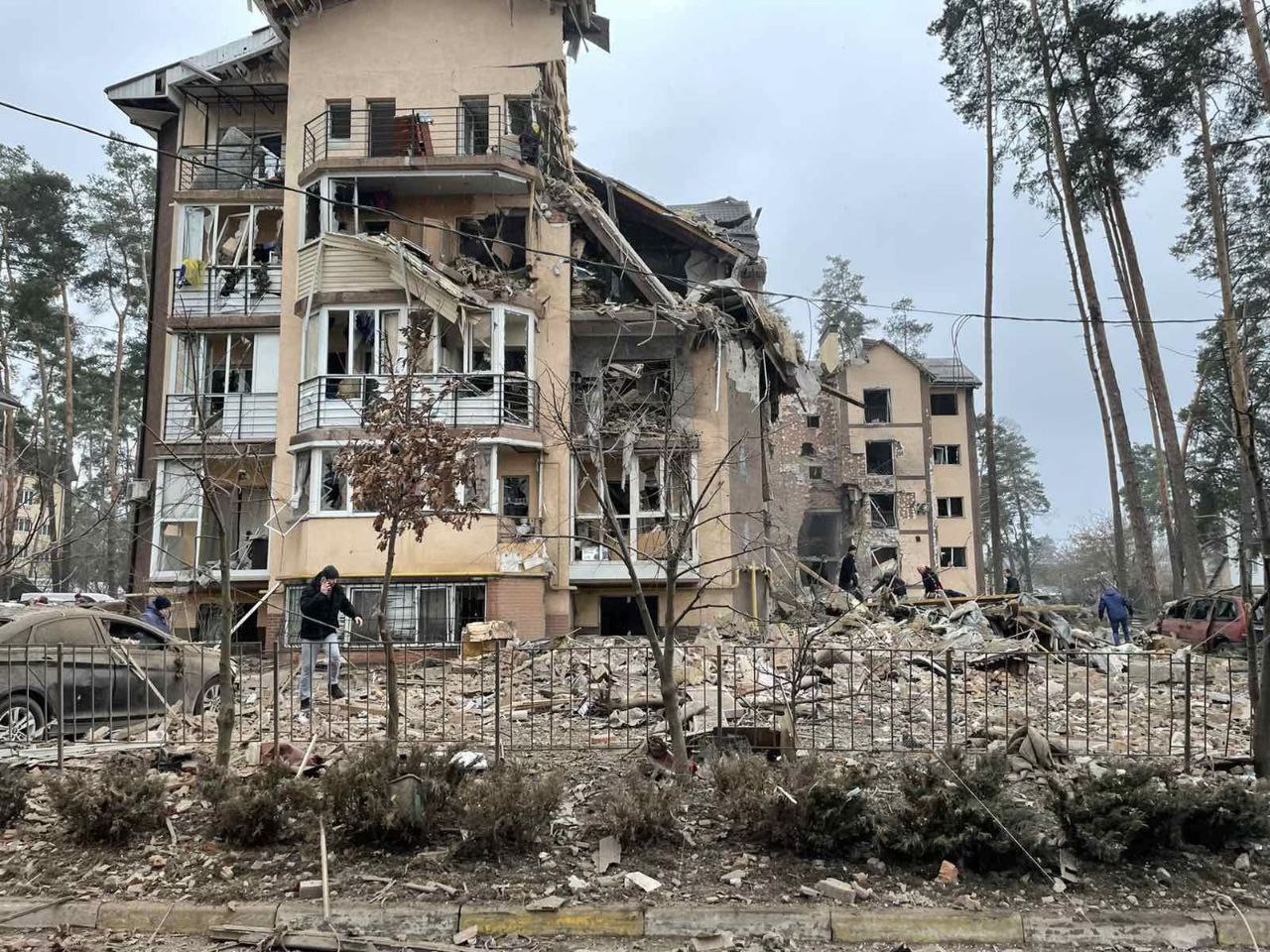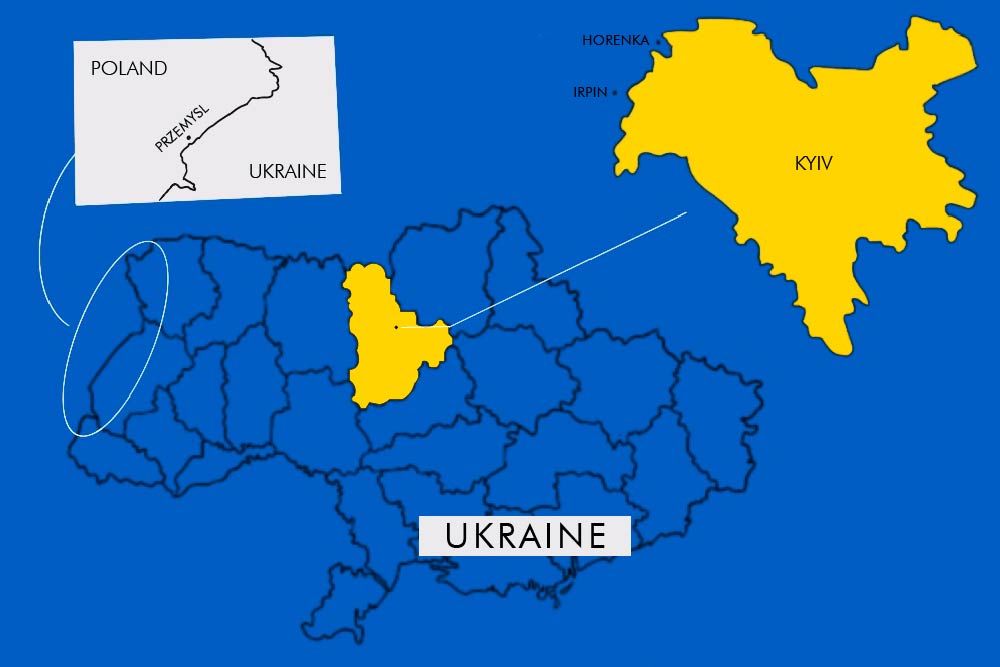
A Ukrainian evacuee hugs a child in the train station in Przemysl, near the Polish-Ukrainian border, on March 22, following Russia’s military invasion launched on Ukraine. Angelos Tzortzinis | Getty Images, via Tribune Media
by R.J. HUNT
Editor
In November 2021, The Voice interviewed WCC student Alona Dytynenko, 28, about her American experience since moving here from Ukraine.
Russia’s president, Vladmir Putin, ordered what he called a “special military operation” on Ukraine on Feb 24. Since invading Ukraine, Russia has been trying to capture different areas of the country, including the capital city, Kyiv. Ukraine is not backing down and the citizens are uniting to defend their sovereignty. Putin’s invasion is affecting millions of Ukrainian families including WCC’s own Alona Dytynenko.
Dytynenko left Ukraine in August 2021 to move to the U.S. Her boyfriend, Platon Slynko, also from Ukraine, moved to the U.S. for work and she later followed. Unlike Dytynenko and Slynko, their families back home are witnessing the battles first hand.

A residential building destroyed in Irpin, 20 km from Kyiv. Courtesy of Julia Loburec
Dytynenko’s family, including her father, mother, brother, and grandmothers live in the surburbs 20 miles from Kyiv. Many in Ukraine have left for the suburbs because it’s deemed safer than living in the city. Dytynenko said her family is able to hear the bombs from where they stay.
“(My family) is safe for now, but everyday we are afraid that something bad might happen,” said Dytynenko.
The war has changed how much Dytynenko is in contact with her family. Before the war, Dytynenko would reach out to her family once a week just to see how they were doing. Now she reaches out every day to make sure they are still OK. “It’s really worrying of what you see in Ukraine,” said Dytynenko. “What you see on the American news is the truth.”
The Dytnenko family chose not to leave Ukraine because it would be hard on her grandmothers to move. Also, her mother doesn’t want to leave Dytynenko’s father behind. Ukraine has an order in place stating that all military aged men (ages 18-60) cannot leave the country, and since Dytynenko’s father is 55 years old, he must stay.
Dytynenko’s father is not forced to fight. He chooses not to because he is the only one in the family working. He is an entrepreneur who owns a small business and several properties. As the provider, he does not feel comfortable going to battle.

Map of Ukraine highlighting Kyiv, Horenka, and Irpin. Illustration by Janani Murugesan
While Dytynenko’s family decided to stay in Ukraine, her boyfriend, Platon Slynko’s family decided to leave for Poland during the first week of the war. His father was forced to stay due to the military age order, but Slynko’s mother, siblings, and grandmother moved to Poland.
The Slynko family’s house is located in an area that Russia wanted to use for its troops. Slynko described his family telling him about the sleepless night they had during one of the first nights of the war. His family could hear explosions and gunshots. His father explained that he got so used to hearing the loud noises that when he was finally able to go to sleep, he would wake up like ‘Wait, what’s going on,’ when they finally stopped.

Slynko’s father took this picture as he was able to look out his window and see this burning home in Horenka, 15 km from Kyiv. Courtesy of Slynko.
Both Dytynenko and Slynko’s families are considered middle class. Slynko’s mom stopped working because she left the country, but his dad still works at Romodanov Neurosurgery Institute as the head of spinal neurosurgery. Dytynenko’s family is living off savings at the moment. They feel they will be alright for the next few months. One of Dytynenko and Slynko’s biggest worries seems to be Ukraians of more modest means. Slynko said he has no idea what Ukrainian citizens in lower economic classes will do because many aren’t working while they shelter at home.
Dytynenko says she has had people come up to her to express their support for Ukraine. “People have come up to me saying ‘Praying for Ukraine’, and I really appreciate that,” said Dytynenko. On the other hand, Slynko wishes the U.S. would do more to help.
The main thing Slynko wants to see the U.S. assist with is military support. “Ground troops would be helpful, but there’s no shortage of people on the ground,” said Slynko. So many people have tried to sign up to fight to the point the Ukrainian government spoke up and said they have enough people ready to battle.
Slynko feels Ukraine’s biggest issue is the air. Ukraine is able to defend the ground, but they are not the best equipped to fight in the air. He wants the U.S. and other nations to close the sky and turn Ukraine into a “no fly zone.” That means no aircraft would be able to fly over the country of Ukraine. The problem is that to enforce this rule, there must be strong military action ready to put in play and the U.S. is hesitant,
Slynko noted that when Ukraine’s president talked to the U.S. Congress, he brought up Pearl Harbor and 9/11. Those kinds of attacks are happening in Ukraine every day now, Slynko said.
He wants people to know that moral support is appreciated, but he thinks the best way to help and show support is by donating money to different organizations and the Ukrainian government.
He suggested that another way Americans can support is to… stop complaining about the increasing gas prices. The U.S. banned importing Russian oil and gas which did cause gas prices to go up.
“Nobody knew what was going to happen, nobody knew how long this was going to take, nobody knew if Ukraine was going to be able to stand up to Russia,” said Slynko. “But, as you can see Ukraine can stand up to Russia.”
If you want to help Ukraine, here are links to donate to or other ways to volunteer help:


